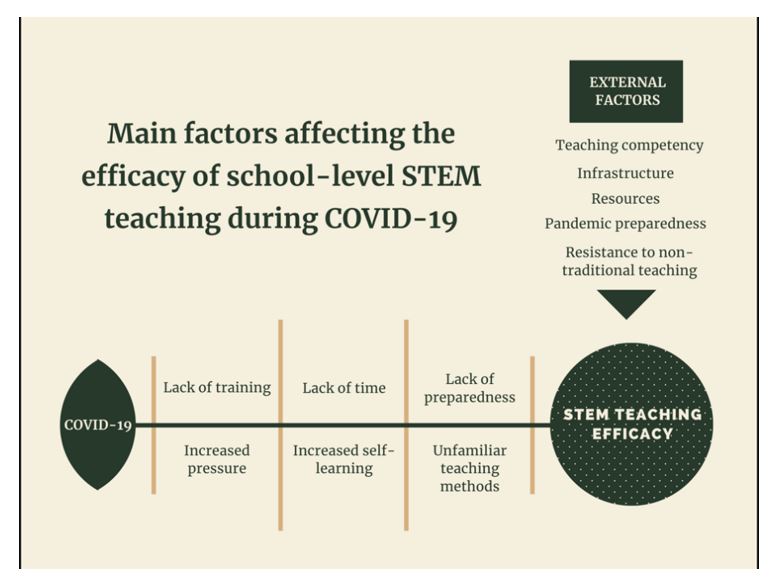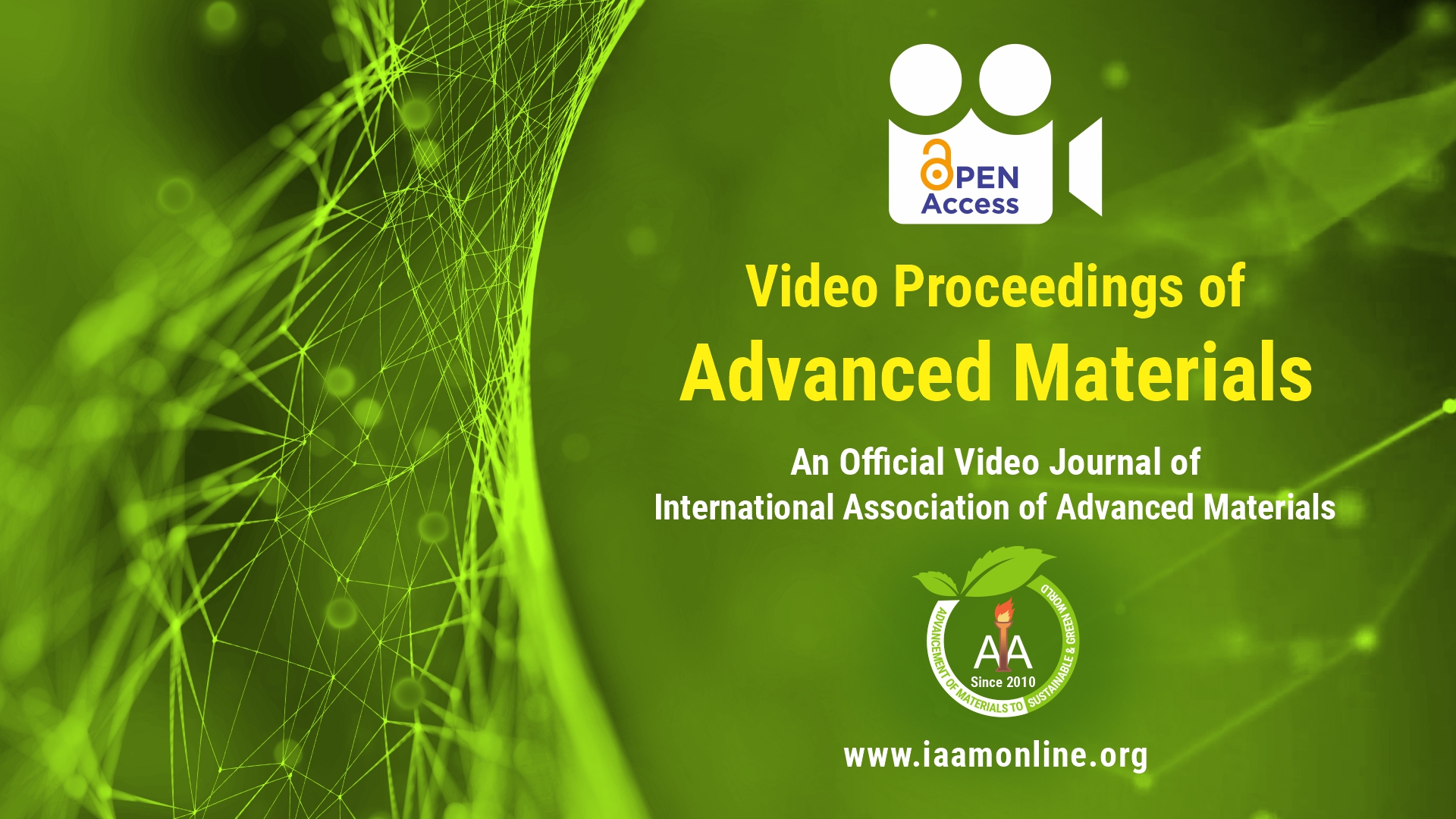Video Article Open Access
COVID-19’s Impact on STEM Teaching Efficacy in Schools
Ganapathi Janani1*, Sharma Jyoti2, Yarlagadda Prasad1
1Queensland University of Technology, Brisbane, Australia
2Department of Science and Technology, Government of India, New Delhi, India
Vid. Proc. Adv. Mater., Volume 2, Article ID 2021-03151 (2021)
DOI: 10.5185/vpoam.2021.03151
Publication Date (Web): 03 May 2021
Copyright © IAAM
Graphical Abstract

Abstract
Coronavirus (COVID-19) has had a tremendous impact on STEM education, resulting in the urgent implementation of novel teaching measures to provide continuing school education. The expectations placed upon STEM teachers has increased manifold, with teachers having to adapt to sudden changes in teaching methods and practices. Our current and ongoing research is a comparative study assessing Australian and Indian STEM teachers’ teaching challenges and perceptions, seeking to develop best practices and a framework to support the enhancement of STEM teaching in post-COVID classrooms. The mixed methods approach was utilized for this research, involving both quantitative and qualitative data collection. The survey method was used to gather a wide range of data from over 200 schools across Australia and India, as well as to identify common or divergent patterns in STEM teacher responses. Over 25 audio-recorded semi-structured interviews were conducted to gather in-depth insights into the challenges, experiences and opinions of teachers. The preliminary results of this ongoing research indicate, there is increased pressure on STEM teachers to learn quickly and adapt to novel technologies and teaching solutions, with hardly any preparation. Secondly, teachers are expected to drastically alter their teaching pedagogies and practices to meet the new challenges and ensure effective and continued quality teaching. Thirdly, the delivery of complex STEM concepts through the virtual classrooms, student assessments and ensuring student engagement are major problems teachers need help with. Lastly, the lack of time and elaborate teacher training to adapt to blended-learning and remote teaching are affecting the overall efficacy of STEM education delivery. Based on the analysis of the preliminary findings, a number of initial conclusions can be drawn. While COVID-19 has disrupted STEM education globally, developed countries such as Australia have showcased a better ability to cope with the situation, due to the resources, infrastructure and teachers’ technology awareness. Countries such as India on the other hand, with a significant number of rural schools, face a greater challenge, thus affecting the efficacy of STEM teaching delivery. In such circumstances, young STEM teachers from urban schools and with a good understanding of technology usage are largely found to be at ease with a shift to remote or blended-learning approaches. In the case of both the countries however, the older and more ‘traditional’ teacher population seems to be the most impacted, requiring urgent training and upskilling to meet the needs of current virtual classrooms and uphold the quality of STEM education. It is equally essential to review and update the STEM pedagogy and teaching practices for a post-pandemic classroom, by providing an early plan, resources and training for teachers, especially the ones working in rural schools and with limited or no knowledge of technology usage. As this comparative research progresses further, we hope to develop further understanding, as well as best practices and a framework in order contribute towards the improvement of STEM teaching in schools across the two countries.
Keywords
covid19; stem education; teaching practices; virtual classrooms; pedagogy.
Acknowledgement
We acknowledge the support of the Queensland University of Technology, in providing us with the necessary resources to undertake this research.
References
- Elfrianto Elfrianto, Irfan Dahnial, & Bahdin Nur Tanjung, The competency analysis of principal against teachers in conducting distance learning in COVID-19 pandemic, 2020, Tarbiyah (Medan, Indonesia), 27(1). https://doi.org/10.30829/tar.v27i1.704
- Timms, M. J., Moyle, K., Weldon, P. R., & Mitchell, P. Challenges in STEM Learning in Australian Schools: Literature and Policy Review, 2018, Australian Council for Educational Research. Retrieved from https://research.acer.edu.au/cgi/viewcontent.cgi?article=1028&context=policy_analysis_misc
- Moszkowicz D, Duboc H, Dubertret C, Roux D, Bretagnol F. Daily medical education for confined students during coronavirus disease 2019 pandemic: A simple videoconference solution. Clin Anat., 2020; 33: 927–928. https://doi.org/10.1002/ca.23601
- Thinking about Pedagogy in an Unfolding Pandemic An Independent Report on Approaches to Distance Learning During COVID19 School Closures, (n.d.), Education International & UNESCO.
- Rasmitadila, R., Aliyyah, R., Rachmadtullah, A., Samsudin, E., Syaodih, M., Nurtanto, A., & Tambunan, A., The Perceptions of Primary School Teachers of Online Learning during the COVID-19 Pandemic Period: A Case Study in Indonesia. Journal of Ethnic and Cultural Studies, 2020, 7(2), 90–109. https://doi.org/10.29333/ejecs/388
Biography
Janani Ganapathi is an early career academic with internationally acquired interdisciplinary research and teaching experience. She holds an interdisciplinary Ph.D., which investigated the role of open education from a social justice perspective. She is currently a Postdoctoral Research Fellow at the Queensland University of Technology, Australia, undertaking transdisciplinary research in the area of STEM teaching and learning, offering expertise in qualitative methods. Dr. Ganapathi is also actively involved in teaching higher degree research modules on transdisciplinarity and key concepts for researchers. Her research and teaching interests include: learning and teaching strategies, open education, STEM education practices, qualitative research methods, and transdisciplinarity in research.
Video Proceedings of Advanced Materials

Upcoming Congress



